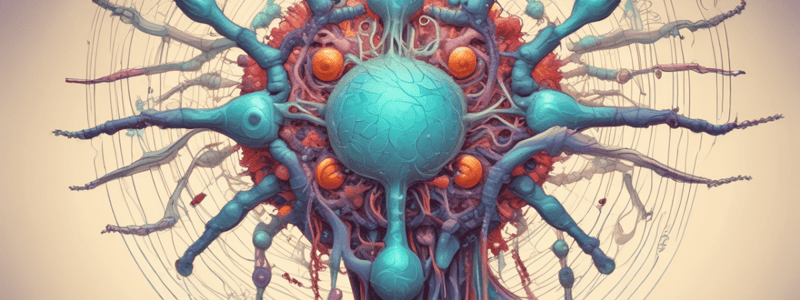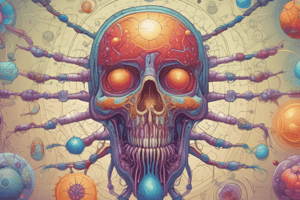Podcast
Questions and Answers
What is the primary function of the innate immune system?
What is the primary function of the innate immune system?
- To recognize and respond to general patterns of pathogens (correct)
- To eliminate pathogens through cell-mediated immunity
- To provide long-term immunity against specific pathogens
- To produce antibodies in response to antigen exposure
Which type of immunity is acquired through exposure to specific pathogens?
Which type of immunity is acquired through exposure to specific pathogens?
- Cell-mediated immunity
- Humoral immunity
- Innate immunity
- Adaptive immunity (correct)
What is the role of macrophages in the immune response?
What is the role of macrophages in the immune response?
- To produce antibodies in response to antigen exposure
- To recognize and respond to specific antigens
- To engulf and digest foreign particles, and present antigens to T cells (correct)
- To coordinate the immune response through cytokine signaling
What is the primary function of cytokines in the immune response?
What is the primary function of cytokines in the immune response?
What is the end result of the immune response process?
What is the end result of the immune response process?
Which type of immune response involves the activation of B cells and the production of antibodies?
Which type of immune response involves the activation of B cells and the production of antibodies?
Flashcards are hidden until you start studying
Study Notes
Introduction to Immunity
- Immunity is the body's defense against infectious organisms and other foreign substances
- Two types of immunity: innate and adaptive
Innate Immunity
- Present from birth
- Provides immediate defense against infection
- Includes physical barriers (skin, mucous membranes) and cellular components (neutrophils, macrophages)
- Recognizes general patterns of pathogens, not specific antigens
Adaptive Immunity
- Acquired through exposure to specific pathogens
- Involves activation of immune cells (B cells, T cells) and production of antibodies
- Highly specific to specific antigens
- Includes two types:
- Humoral immunity (B cells, antibodies)
- Cell-mediated immunity (T cells)
Key Players in Immunity
- White blood cells (WBCs): defend against infection
- Neutrophils: engulf and digest foreign particles
- Lymphocytes (B cells, T cells): recognize and respond to specific antigens
- Macrophages: engulf and digest foreign particles, present antigens to T cells
- Antibodies: proteins produced by B cells, recognize and bind to specific antigens
- Cytokines: signaling molecules that coordinate immune response
Immune Response Process
- Recognition: recognition of antigen by immune cells (e.g., T cells, B cells)
- Activation: activation of immune cells and production of cytokines
- Elimination: elimination of pathogen through various mechanisms (phagocytosis, antibody-dependent complement-mediated cytotoxicity)
- Memory: formation of immune memory, allowing for rapid response to future infections
Immunity Overview
- Body's defense against infectious organisms and foreign substances
- Two types of immunity: innate and adaptive
Innate Immunity
- Present from birth, providing immediate defense against infection
- Includes physical barriers (skin, mucous membranes) and cellular components (neutrophils, macrophages)
- Recognizes general patterns of pathogens, not specific antigens
Adaptive Immunity
- Acquired through exposure to specific pathogens, highly specific to antigens
- Involves activation of immune cells (B cells, T cells) and production of antibodies
- Divided into two types: humoral immunity (B cells, antibodies) and cell-mediated immunity (T cells)
White Blood Cells (WBCs)
- Defend against infection
- Neutrophils engulf and digest foreign particles
- Lymphocytes (B cells, T cells) recognize and respond to specific antigens
- Macrophages engulf and digest foreign particles, present antigens to T cells
Antibodies
- Proteins produced by B cells, recognizing and binding to specific antigens
Cytokines
- Signaling molecules that coordinate immune response
Immune Response Process
Recognition
- Recognition of antigen by immune cells (e.g., T cells, B cells)
Activation
- Activation of immune cells and production of cytokines
Elimination
- Elimination of pathogen through various mechanisms (phagocytosis, antibody-dependent complement-mediated cytotoxicity)
Memory
- Formation of immune memory, allowing for rapid response to future infections
Studying That Suits You
Use AI to generate personalized quizzes and flashcards to suit your learning preferences.




